|
|
| |
|
| |
Chinese Edition of Selected Chapters
published by Nanjing Press Company
Co-edited by
Hans Günter Brauch,
Chairman of AFES-PRESS
Úrsula Oswald Spring,
National Autonomous University of Mexico (UNAM)
Centre for Regional Multidisciplinary Research (CRIM)
and Chairwoman of the Scientific Advisory Board of AFES-PRESS
John Grin,
Department of Political Science,
University of Amsterdam, Amsterdam, The Netherlands
and AFES-PRESS Deputy Chairman
Czeslaw Mesjasz,
Department of Management,
Cracow University of Economics, Krakow, Poland
and AFES-PRESS Deputy Chairman
Liu Cheng,
Department of History, Nanjing University, Nanjing China (Eds.):
Based on chapters previously published in these three books |
| |
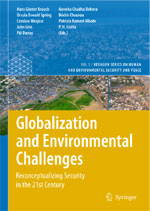 |
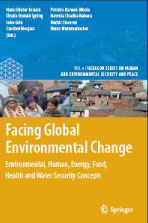 |
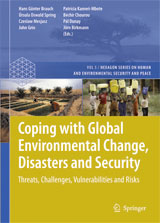 |
| |
With the financial support for the translation
by the
Nanjing Peace Museum in Nanjing, China
The translation was supervised by
Prof. Liu Cheng, Nanjing |
| |
Volume 1:
Hans Günter Brauch, Úrsula Oswald Spring, Czeslaw Mesjasz, John Grin, Liu Cheng (Eds.):
Globalization and Environmental Challenges:
Reconceptualizing Security in the 21st Century
|
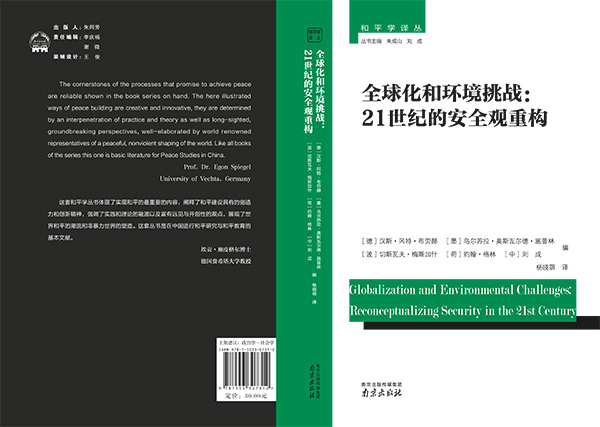 |
| |
| Authors in alphabetical order: |
| |
J. Frederik M. Arends, The Netherlands
John Baylis, United Kingdom
Navnita Chadha Behera, India
Hans Günter Brauch, Germany
Michael von Brück, Germany
Naresh Dadhich, India
Jonathan Dean, USA |
Eun-Jeung Lee, South Korea/Germany
Czeslaw Mesjasz, Poland
Mitsuo and Tamayo Okamoto, Japan
Ursula Oswald Spring, Mexico
Kurt W. Radtke, Germany/The Netherlands
Ole Wæver, Denmark |
|
| |
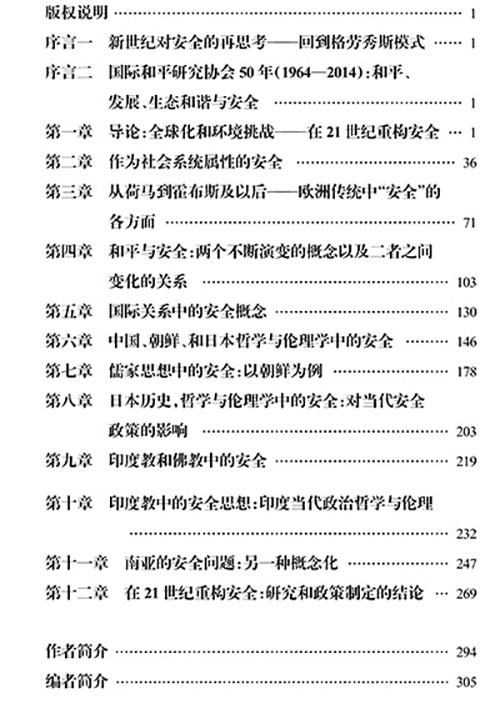 |
Contents
On the Chinese Edition of Selected Chapters of the Global Environmental and Human Security Handbook for the Anthropocene (GEHSHA)
Hans Günter Brauch
Permissions and Credits
Preface: Rethinking Security in the New Century - Return to the Grotean Pattern
Jonathan Dean
Preface: IPRA at 50: Peace, Development, Ecology and Security
Ursula Oswald Spring
- Introduction: Globalization and Environmental Challenges: Reconceptualizing Security in the 21st Century
Hans Günter Brauch
- Security as Attributes of Social Systems
Czeslaw Mesjasz
- From Homer to Hobbes and Beyond - Aspects of 'Security' in the European Tradition
J. Frederik M. Arends
- Peace and Security: Two Evolving Concepts and Their Changing Relationship
Ole Wæver
- The Concept of Security in International Relations
John Baylis
- Security in Chinese, Korean, and Japanese Philosophy and Ethics
Kurt W. Radtke
- Security in Confucian Thought: Case of Korea
Eun-Jeung Lee
- Security in Japanese History, Philosophy and Ethics: Impact on Contemporary Security Policy
Mitsuo and Tamayo Okamoto
- Security in Hinduism and Buddhism
Michael von Brück
- Thinking on Security in Hinduism: Contemporary Political Philosophy and Ethics in India
Naresh Dadhich
- Alternative Conceptualizations
Navnita Chadha Behera
- Reconceptualizing Security in the 21st Century: Conclusions for Research and Policymaking
Ursula Oswald Spring and Hans Günter Brauch
On the Editors
On the Contributors
On AFES-PRESS
Hexagon Series on Human and Environmental Security and Peace |
| |
Volume 2:
Hans Günter Brauch, Úrsula Oswald Spring, Czeslaw Mesjasz, John Grin, Liu Cheng (Eds.):
Facing Global Envi¬ron¬mental Change:
Environmental, Human, Energy, Food, Health and Water Security Con-cepts
|
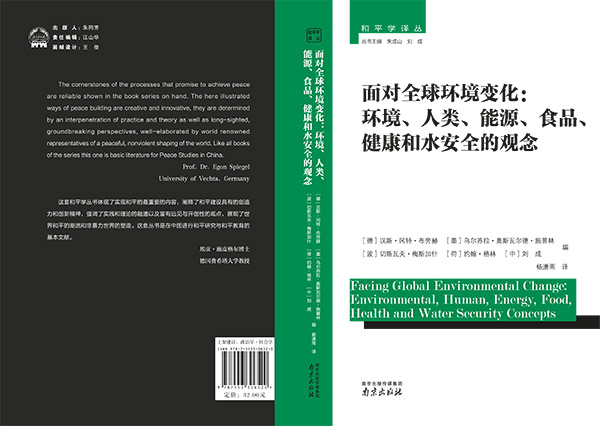 |
| |
| Authors in alphabetical order: |
| |
Imtiaz Ahmed, Bangladesh
Madhavi Malalgoda Ariyabandu, Sri Lanka
Hans Günter Brauch, Germany
Simon Dalby, Canada
Dilrukshi Fonseka, Sri Lanka
Rik Leemans, The Netherlands
J.R. McNeill, USA
Joy Ogwu, Nigeria |
Ursula Oswald, Mexico
Zarina Othman, Malaysia
Rajendra K. Pachauri, India
Serena Erendira Serrano Oswald, Mexico
Thanh-Dam Truong, Vietnam/The Netherlands
Ben Wisner, USA
Surichai Wun'Gaeo, Thailand |
|
| |
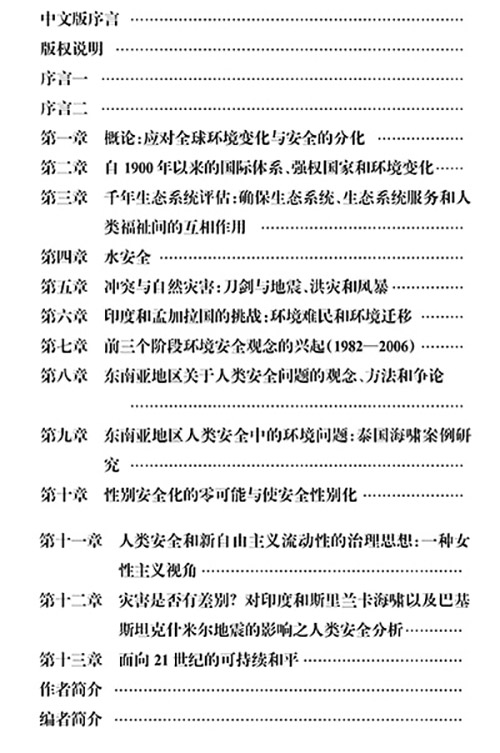 |
Contents
On the Chinese Edition of Selected Chapters of the Global Environmental and Human Security Handbook for the Anthropocene (GEHSHA)
Hans Günter Brauch
Permissions and Credits
Preface: Rajendra K. Pachauri, Director-General of TERI, chairman of the Intergovern-mental Panel on Climate Change (IPCC)
Preface: Joy Ogwu, Permanent Representative of the Federal Republic of Nigeria to the United Nations in New York
- Introduction: Facing Global Environmental Change and Sectorialization of Security
Hans Günter Brauch
- The International System, Great Powers, and Environmental Change since 1900
J.R. McNeill
- The Millennium Ecosystem Assessment: Securing Interactions between Ecosystems, Ecosystem Services and Human Well-being
Rik Leemans
- Securitizing Water
Ursula Oswald Spring and Hans Günter Brauch
- Interactions between Conflict and Natural Hazards: Swords, Ploughshares, Earthquakes, Floods and Storms
Ben Wisner
- Environmental Refugees and Environmental Distress Migration as a Security Challenge for India and Bangladesh
Imtiaz Ahmed
- Environmental Security Concepts Revisited During the First Three Phases (1983- 2006)
Simon Dalby, Hans Günter Brauch, Ursula Oswald Spring
- Human Security Concepts, Approaches and Debates in Southeast Asia
Zarina Othman
- Environment as an Element of Human Security in Southeast Asia: Case Study on the Thai Tsunami
Surichai Wun'Gaeo
- The Impossibility of Securitizing Gender vis a vis 'Engendering' Security
Serena Erendira Serrano Oswald
- Human Security and the Govern-mentality of Neo-liberal Mobility: A Feminist Perspective
Thanh-Dam Truong
- Do Disasters Discriminate? A Human Security Analysis of the impact of the Tsunami in India, Sri Lanka and of the Kashmir Earthquake in Pakistan
Madhavi Malalgoda Ariyabandu and Dilrukshi Fonseka
- Towards Sustainable Peace for the 21st Century
Hans Günter Brauch and Ursula Oswald Spring
On the Contributors
On the Editors
On AFES-PRESS
Hexagon Series on Human and Environmental Security and Peace |
| |
Volume 3:
Hans Günter Brauch, Úrsula Oswald Spring, Czeslaw Mesjasz, John Grin, Liu Cheng (Eds.):
Coping with Global Environmental Change, Disasters and
Security Threats, Challenges, Vulnerabilities and Risks
|
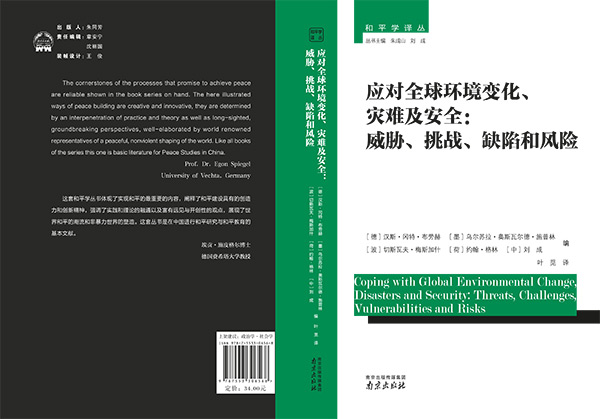 |
| |
| Authors in alphabetical order: |
| |
Ulrich Beck, Germany
Hans Günter Brauch, Germany
Paul Crutzen, The Netherlands
Simon Dalby, Canada
Jayantha Dhanapala, Sri Lanka
Ernst Giese, Germany
John Grin, The Netherlands
Thomas Heberer, Germany
Veronika Huber, Germany
Michael Krause, Germany
Hermann Lotze-Campen, Germany
Esther Marijnen, The Netherlands
Lidia Mesjasz, Poland |
Christoph Müller, Germany
Ursula Oswald Spring, Mexico
Alexander Popp, Germany
Jürgen Scheffran, Germany
Hans Joachim Schellnhuber, Germany
Jenniver Sehring, Germany
Anja D. Senz, Germany
Omar Serrano, Mexico/Switzerland
Xiaomeng Shen, China/Germany
Achim Steiner, Germany
Anastasia Svirejeva-Hopkins, Canada
Hania Zlotnik, Mexico/USA |
|
| |
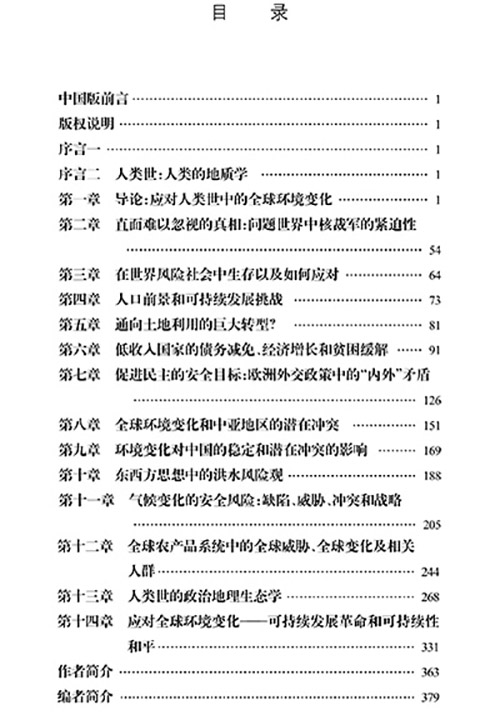 |
Contents
On the Chinese Edition of Selected Chapters of the Global Environmental and Human Security Handbook for the Anthropocene (GEHSHA)
Hans Günter Brauch
Permissions and Credits
Preface: Achim Steiner, Executive Director of the United Nations Environ-ment Programme (UNEP) and Under-Secretary-General of the United Nations
Preface: The Anthropocene: Geology by Mankind Paul Crutzen, Nobel Laureate for Chemistry Planck Institute for Chemistry Department Atmospheric Chemistry
- Introduction: Coping with Global Environmental Change in the Anthropocene
Hans Günter Brauch and Ursula Oswald Spring
- Connecting Inconvenient Truths: Urgency of Nuclear Disarmament in a World of Pressing Problems
Amb. Jayantha Dhanapala
- Living in and Coping with World Risk Society
Ulrich Beck
- Population Prospects and the Challenges of Sustainability
Hania Zlotnik
- Towards a Great Land-Use Transformation?
Christoph Müller, Hermann Lotze-Campen, Veronika Huber, Alexander Popp, Anastasia Svirejeva-Hopkins, Michael Krause and Hans Joachim Schellnhuber
- Debt Relief, Economic Growth and Poverty Reduction in Low-Income Countries
Lidia Mesjasz
- Promoting Democracy as a Security Goal. The 'inward-outward' Paradox of the EU's Foreign Policy
Omar Serrano
- Global Environmental Change and Conflict Potential in Central Asia
Jenniver Sehring and Ernst Giese
- Impact of Environmental Change on Stability and Conflict Potentials in China
Thomas Heberer and Anja D. Senz
- Linking Oriental and Western Thinking to Mitigate Flood Risk
Xiaomeng Shen
- Security Risks of Climate Change: Vulnerabilities, Threats, Conflicts and Strategies
Jürgen Scheffran
- Global Threats, Global Changes and Connected Communities in the Global Agrofood System
John Grin and Esther Marijnen
- Political Geoecology for the Anthropocene
Hans Günter Brauch, Simon Dalby and Ursula Oswald Spring
- Coping with Global Environmental Change - Sustainability Revolution and Sustainable Peace
Ursula Oswald Spring and Hans Günter Brauch
Biographies of Contributors
On the Editors
On AFES-PRESS
Hexagon Series on Human and Environmental Security and Peace |
| |
| On the Editors |
| |
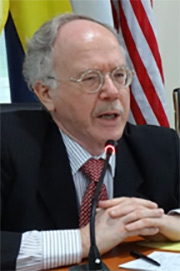 |
Hans Günter Brauch (Germany), Dr. phil. habil, has been since 1987 chairman of Peace Re¬search and European Security Studies (AFES-PRESS). He was Adj. Prof. (Privatdozent) at the Free University of Berlin (1999-2012); guest professor of international relations at the universities of Frankfurt on Main, Erfurt, Leipzig and Greifswald (Germany). He was a research fellow at Harvard and Stanford University and taught at the universities of Darmstadt, Tübingen, Stuttgart and Heidelberg, at SciencePo (Paris), European Peace University (Austria), National Autonomous University of Mexico (UNAM). He teaches at National University of Malaysia (UKM) and Chulalongkorn University in Bangkok (Thailand). He is the editor of three English language bookseries published by Springer: Hexagon Book Series on Human and Environmen¬tal Security and Peace (HESP), Springer Briefs on Environment, Security, Development and Peace (ESDP) and on Pioneeres in Science and Practice (PSP).
Publications: He has published books, studies and research reports, book chapters, articles in journals on security, armament, climate, energy and migration policies and on Mediterranean issues in English and German that were translated into Spanish, Greek, French, Danish, Finnish, Russian, Japanese, Portuguese, SerboCroatian, Turkish and Chinese. His recent books in English include: (co-ed. with Oswald Spring, Mesjasz, Grin, Dunay, Chadha Behera, Chourou, Kameri-Mbote, Liotta): Globalization and Environmental Challenges: Reconceptualizing Security in the 21st Century, 2008; (co-ed. with Oswald Spring, Grin, Mesjasz, Kameri-Mbote, Chadha Behera, Chourou, Krummenacher): Facing Global Environmental Change: Environmental, Human, Energy, Food, Health and Water Security Concepts (2009); (Guest co-edit. with Oswald Spring; Aydin of a special issue of: Uluslararasi Iliskiler / International Relations, 5,18; 2009: (co-edit. with Oswald Spring, Tsardanidis and Kinnas of Agora, Summer 2010; (co-ed. with Oswald Spring, Mesjasz, Grin, Kameri-Mbote, Chourou, Dunay, Birkmann: Coping with Global Environmental Change, Disasters and Security – Threats, Challenges, Vulnerabilities and Risks, 2011); (co-edit. with Scheffran, Brzoska, Link, Schilling: Climate Change, Human Security and Violent Conflict: Challenges for Societal Stability, 2012; (co-ed. with Oswald Spring, Mesjasz, Grin, Scheffran (Eds.): Handbook on Sustainability Transition and Sustainable Peace, 2014).
Address: PD Dr. Hans Günter Brauch, Alte Bergsteige 47, 74821 Mosbach, Germany.
Email: <brauch@afes-press.de>.
Website: < http://www.afes-press.de> and <http://www.afes-press-books.de/>. |
| |
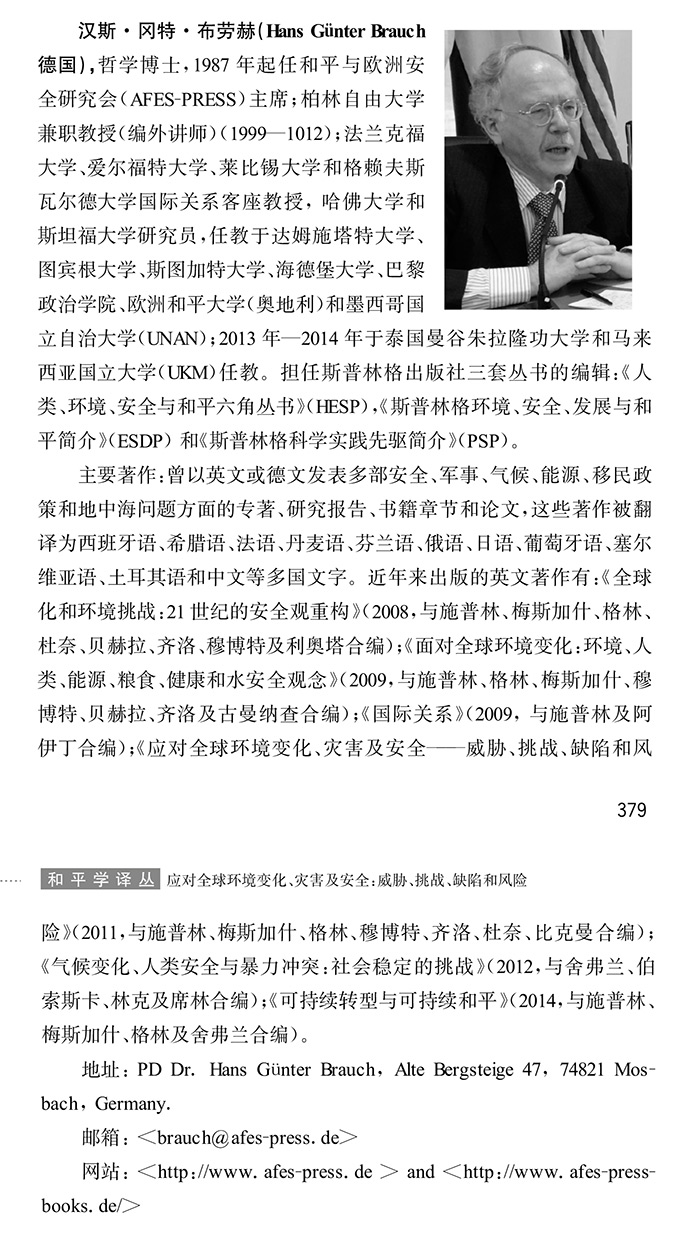 |
| |
Úrsula Oswald Spring (Mexico), full time Professor/Researcher at the National University of Mexico (UNAM) in the Regional Multidisciplinary Research Center (CRIM), lead author of the IPCC. She was national coordinator of water research for the National Council of Science and Technology (RETAC-CONACYT) in Mexico, MunichRe Foundation Chair on Social Vulnerability at the United National University Institute for Environment and Human Security (UNU-EHS), founding Secretary General of El Colegio de Tlaxcala; General Atto¬ney of Ecology in the State of Morelos (1992-1994) and National Delegate of the Federal General Attorney of Environment (1994-1995), and Minister of Ecological Development in Morelos (1994-1998), She was President of the International Peace Research Association (1998-2000) and General Secretary of the Latin-American Council for Peace Research (2002-2006). She studied medicine, clinical psychology, anthropology, ecology, classical and modern languages and obtained her Ph.D from the University of Zürich (1978). She is co-cahir of the scientific advisory board of AFES-PRESS (since 2005) and member of its board (since 2012).
She has published 48 books and 328 scientific articles and book chapters on sustainability, water, gender, development, poverty, drug consumption, brain damage due to under-nourishment, peasantry, social vulnerability, genetic modified organisms, bioethics and human, gender and environmental security, peace and conflict resolution, democracy and conflict negotiation. Among her major redent English publications are: (ed.): Peace Studies from a Global Perspective: Human Needs in a Cooperative World (New Delhi: Mbooks, 2000); (ed.): International Security, Peace, Development, and Environment, Book 39: Encyclopaedia on Life Support Systems (Paris: UNESCO - EOLSS); Gender and Disasters (Bonn: UNU-EHS, 2008); (co-ed. with Brauch, Mesjasz, Grin, Dunay, Chadha Behera, Chourou, Kameri-Mbote, Liotta): Globalization and Environmental Challenges: Reconceptualizing Security in the 21 st Century, 2008; (co-ed. with Brauch, Grin, Mesjasz, Kameri-Mbote, Chadha Behera, Chourou, Krummenacher): Facing Global Environmental Change: Environmental, Human, Energy, Food, Health and Water Security Concepts (2009); (ed.): Water Research in Mexico. Scarcity, Degradation, Stress, Conflicts, Management, and Policy (Springer, 2011); (co-ed. with Brauch, Mesjasz, Grin, Kameri-Mbote, Chourou, Dunay, Birkmann: Coping with Global Environmental Change, Disasters and Security – Threats, Challenges, Vulnerabilities and Risks, 2011); (co-ed. with Oswald Spring, Mesjasz, Grin, Scheffran (Eds.): Sustainability Transition and Sustainable Peace Handbook, 2014).
Address: Prof. Dr. Úrsula Oswald Spring, Priv. Río Bravo Núm. 1, Col. Vistahermosa,
Cuernavaca, Morelos, 62290 México.
Email: <uoswald@gmail.com> and <uoswald @servidor.unam.mx>.
Website: <http://www.afes-press.de/html/download_oswald.html>. |
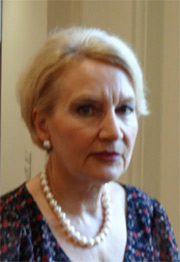
|
| |
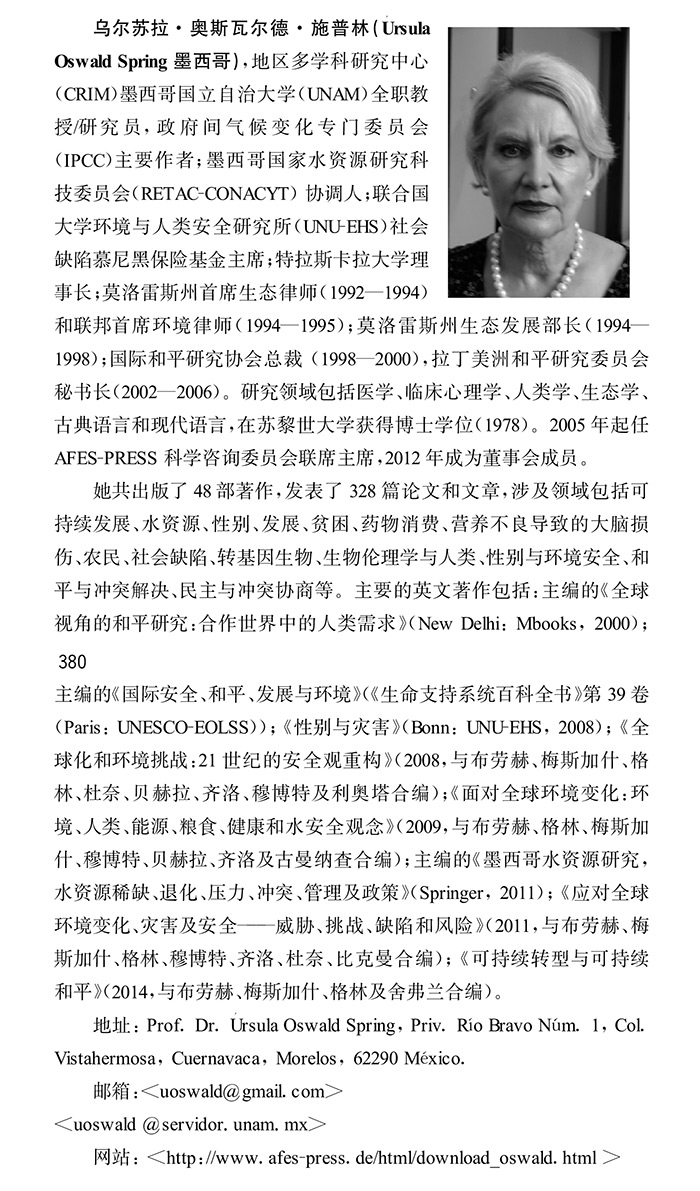 |
| |
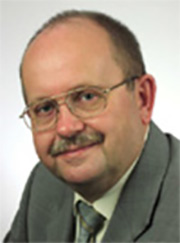 |
Czeslaw Mesjasz (Poland): Dr habil., Associate Professor, Faculty of Management, Cracow University of Economics, Cracow, Poland. His research interests include applications of systems approach in management and in international relations, game theory, conflict resolution and negotiation, corporate governance and the links between economics, finance and security. In 1992-1996 he was the convener of the Defence and Disarmament Commission of IPRA (International Peace Research Association). In 1991-1992 he received a NATO Democratic Institutions Fellowship. In 1992-1993 he was a Visiting Research Fellow at the Centre for Peace and Conflict Research in Copenhagen (later COPRI). In 2005-2008 the Vice Dean of Faculty of Management, Cracow University of Economics. In 2010-2014 Secretary of Research Committee Sociocybernetics (RC51), International Sociological Association. He published some 200 works – two books in Polish, papers and book chapters in Polish and in English on management, security and related areas. His major works in the fields associated with peace and security studies are: “Applications of Systems Modelling in Peace Research”, in: Journal of Peace Research, 25,3, 1988. Co-editor and co-author of the Hexagon Series. Most recent - (co-ed. with Brauch, Oswald Spring, Grin, Kameri-Mbote, Chourou, Dunay, Birkmann: Coping with Global Environmental Change, Disasters and Security – Threats, Challenges, Vulnerabilities and Risks, 2011), Complex Systems Studies and Terrorism, in: Fellman, Bar-Yam, Minai, (eds.) Conflict and Complexity. Countering Terrorism, Insurgency, Ethnic and Regional Violence, Springer Science+Business Media New York 2015, pp. 35-71,
Address: Assoc. Prof. Czeslaw Mesjasz, Cracow University of Economics,
Pl-31-510 Kraków, ul Rakowicka 27, Poland.
Email: <mesjaszc@uek.krakow.pl>.
Website: <https://e-uczelnia.uek.krakow.pl/course/view.php?id=933> and <http://www.afes-press.de/html/mesjasz_en.html>. |
| |
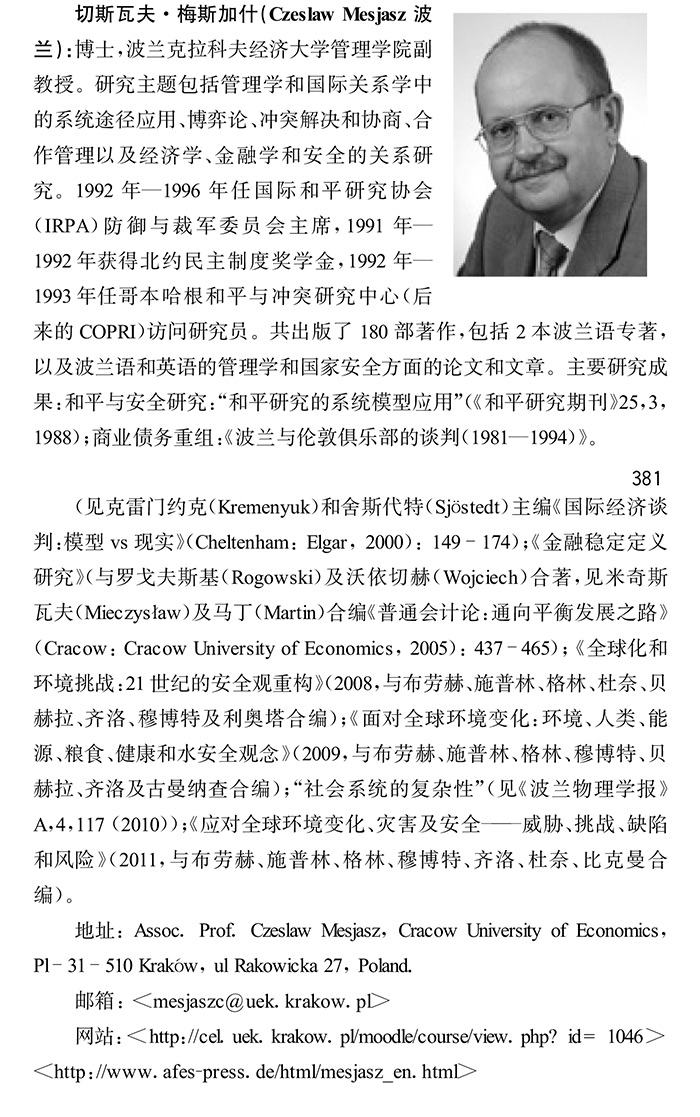 |
| |
John Grin (The Netheralands) is a Full Professor in Policy Science, in particular of System Innovation, Dept. of Political Science, University of Amsterdam, and Co-Director (with Marlies Glasius) of the Programme Group Transnational Configurations, Conflicts and Governance, Amster-dam Institute for Social Science Research (AISSR). A physicist by training (Msc, 1986, VU University-Amsterdam) he did a PhD (1990) on defence technology assessment. He is driven by a profound, life-long interest in the relationships between knowledge, technology, society and policy. He is particularly interested in understanding the ‘politics’ of knowledge and technology and ways to analyze them; and in the intertwined.
He co-edited special issues of the journals Policy Sciences (vol 43[2009] no. 4) and Research Policy (vol. 39 [2010] no. 4) on transitions, and he published (co-authored with Jan Rotmans, Johan Schot: Transitions to Sustainable Development. New Directions in the Study of Long term Structural Change (New York: Routledge, 2010);(co-author with Hans Günter Brauch, Henk van de Graaf, Wim Smit): Militärtechnikfolgenabschätzung und Präventive Rüstungskontrolle. Institutionen, Verfahren und Instrumente (Münster: LIT, 1997); (co-author with Henk van de Graaf, Rob Hoppe): Technology assessment through interaction: A guide (Den Haag: SDU, 1997); (co-ed. with Armin Grunwald): Vision Assessment: Shaping Technology in 21st century society. Towards a repertoire for Technology Assessment (Heidelberg: Springer, 2000); (co-ed. with Wytske Versteeg and Maarten Hajer): Meervoudige democratie – ervaringen met vernieuwend bestuur (Amsterdam: Aksant, 2006) and (co-author with Arienne van Staveren) Werken aan systeeminnovaties (Assen: van Grocum, 2007); (co-ed. with Brauch, Oswald Spring, Mesjasz, Dunay, Chadha Behera, Chourou, Kameri-Mbote, Liotta, 2008): Globalization and Environmental Challenges: Reconceptualizing Security in the 21st Century (Springer); (co-ed. with Brauch, Oswald Spring, Mesjasz, P. Kameri-Mbote, Chadha Behera, Chourou, Krummenacher, 2009): Facing Global Environmental Change: Environmental, Human, Energy, Food, Health and Water Security Concepts (Springer), (co-ed. with Brauch, Oswald Spring, Mesjasz, Kameri-Mbote, Chourou, Dunay, Birkmann: Coping with Global Environmental Change, Disasters and Security – Threats, Challenges, Vulnerabilities and Risks, 2011); (co-ed. with Brauch, Oswald Spring, Scheffran (Eds.): Handbook on Sustainability Transition and Sustainable Peace, 2014).
Address: Prof. Dr. John Grin, Dept. of Political Science, University of Amsterdam
OZ Achterburgwal 237, 1012 DL Amsterdam, Netherlands.
E-mail: <j.grin@uva.nl>.
Website: <http://home.medewerker.uva.nl/j.grin/> and at: <http://www.afes-press.de/html/ grin_en.html>. |
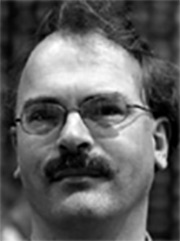
|
| |
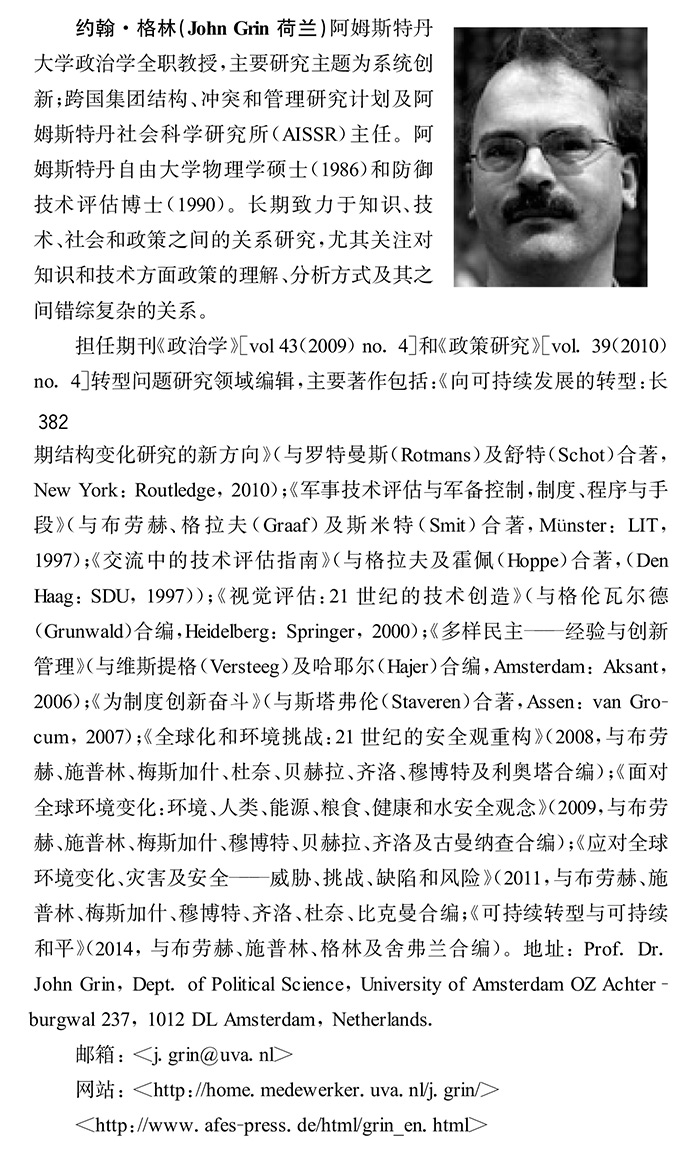 |
| |
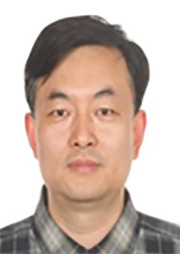 |
Liu Cheng (People’s Republic of China), Dr., is Professor of History at the History Department of Nanjing University of China, where his teaching specialization includes Modern History and Peace Studies. He is the pioneer to introduce peace studies as an academic discipline into Chinese universities and publications. Since 2001, he has been a leader of a British Council-funded programme of academic co-operation between Nanjing University and Coventry University, UK, in the field of peace studies. He was the organizer of 4 major international symposia on peace studies in China in 2005, 2011, 2012 and 2013.
With other colleagues in Nanjing, he is one of the pioneers to intro¬du¬ce peace studies as an academic discipline into Chinese universities and publications. His published works includes 8 books in Chinese, whose titles are: Clause IV: Public Ownership and British Labour Party (2003), Britain: Transition from Great Power to EU Member-state (2005), Wars and the Negotiations (2005), Peace Studies (2006), The Origin and Development of Social Democracy in Europe (2006), The Process of World Modernization (2010), The 20th Century's British Trade Union (2011). The British Modern Transformation and Remaking of Labour Party (2013). Dr Liu also a prolific translator, having recently published Chinese translations of works by Johan Galtung, Andrew Rigby and David P. Barash and Charles P. Webel. In 2009, he edited a set of three books within a series on ‘growing up in peace’, for use in elementary, middle and high schools. He is a member of the British History Association of China, the World Modern History Association of China and of the International Peace Research Association.
Address: Prof. Dr. Liu Cheng, Department of History, Nanjing University,
Nanjing, Jiangsu Province 210093, China.
Email: <liucheng@nju.edu.cn>, |
| |
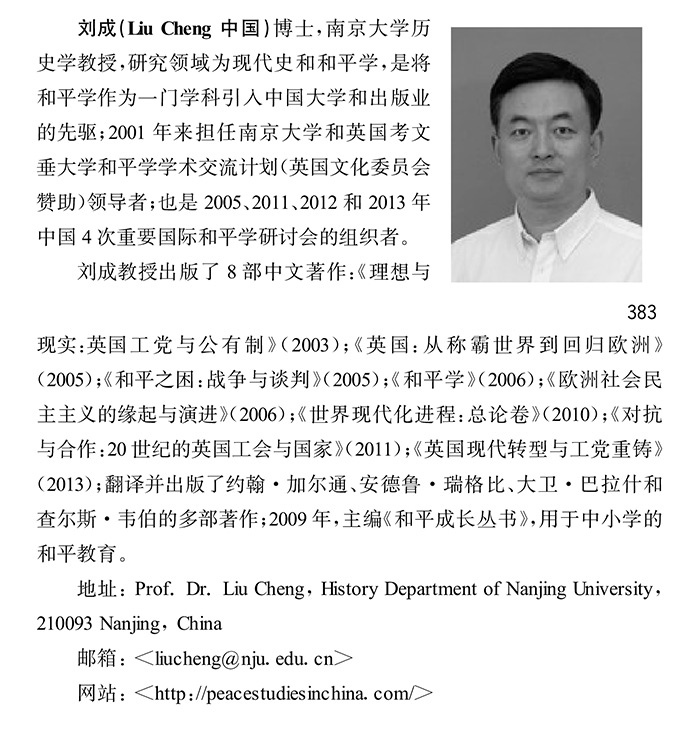 |
|
|
|